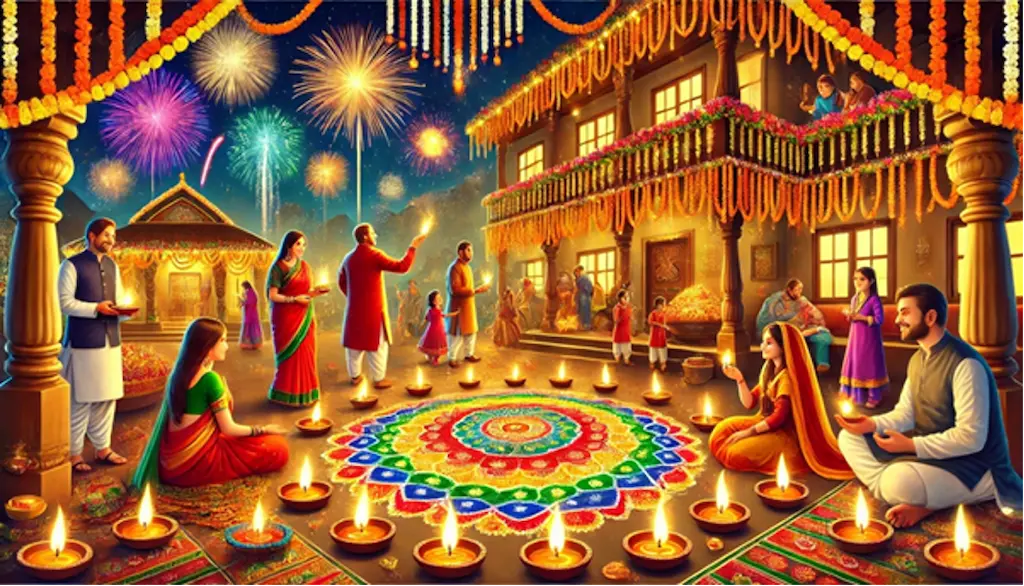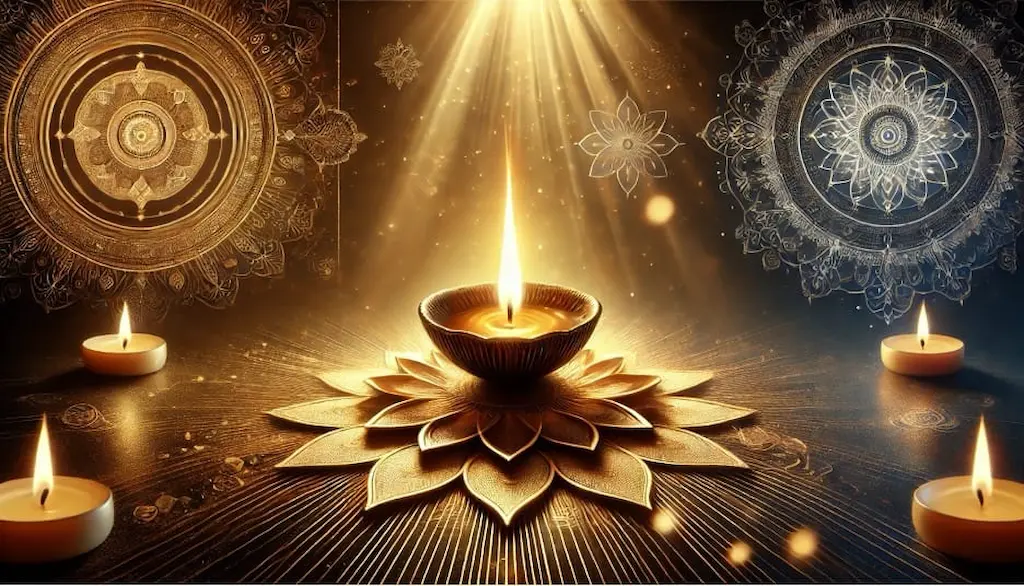As the night sky sparkles with the glow of a thousand diyas and the air fills with the sweet aroma of festive treats, millions around the world prepare to celebrate Diwali, a time of joy, renewal, and spiritual awakening. But beyond the lights and celebrations, Swami Mukundananda ji encourages us to reflect on the deeper meaning of Diwali, emphasizing how we can make this festival not just a celebration of culture but a profound journey of spiritual enlightenment.
In this blog, we will explore how to transform a Diwali celebration into a truly spiritual journey, one that not only brightens our home but also illuminates the soul.
Diwali: A Celebration of Culture and Tradition

The word Diwali is derived from the Sanskrit word Deepavali, which means "a row of lights." This ancient festival has its origins in the era of Shree Ram. As narrated in the Ramayan, when Lord Ram returned to Ayodhya after 14 years of exile, the people celebrated his homecoming by illuminating their homes with lamps. This tradition of lighting lamps continues to this day, symbolizing the victory of light over darkness and good over evil.
Diwali, however, is not just a Hindu festival. For Jains, it marks the day of Mahavir Nirvan Jayanti, celebrating the enlightenment of Bhagavan Mahavir. Sikhs celebrate Diwali as Bandi Chhor Divas, the day when their sixth Guru was released from prison. These diverse traditions all converge on a single theme: the power of inner light to dispel the darkness of ignorance and suffering.
Moving Beyond Customs: The Deeper Meaning of Diwali

Swami Mukundananda ji urges us to embrace the customs of Diwali—cleaning homes, lighting lamps, wearing new clothes—but to also use these rituals as a gateway to deeper spiritual practices. He explains that true celebration is not merely external but internal. It is about cleaning the heart, removing the darkness of ignorance, and inviting divine wisdom and knowledge into our lives.
The lights of Diwali, Swamiji says, are symbolic of the light of wisdom. Just as the residents of Ayodhya rejoiced in welcoming Shree Ram back into their city, we too should celebrate Diwali by welcoming God into our hearts. This is the essence of a truly special Diwali—one that transforms us from within.
Light and Darkness: A Metaphor for Knowledge vs. Ignorance

In his message, Swamiji shares a beautiful story about light and darkness. He compares our journey of life to that of a swan and an owl. While the swan can see in daylight, the owl, blinded by the brightness, insists that it is night. This tale highlights how perceptions of knowledge and ignorance can vary. Just as the owl is unable to see the light, many of us, enveloped in material distractions, fail to perceive the divine light within us.
This Diwali, Swamiji invites us to recognize the light of knowledge and dispel the darkness of ignorance. He reminds us of the famous Sanskrit prayer: tamaso ma jyotir-gamaya, meaning “lead me from darkness to light.” As we light lamps this Diwali, let us also kindle the flame of wisdom in our hearts, realizing that the ultimate victory is not over external forces but over our own ignorance.
The Journey from Worldly Delusion to Spiritual Enlightenment
Swamiji beautifully illustrates the challenges of worldly life through a vivid metaphor of a man lost in a dark forest. The man is chased by wild animals, tempted by fleeting pleasures, and ultimately falls into a pit where he dangles precariously, with dangers lurking around him. Despite his unsafe situation, the man finds momentary joy in tasting honey that drips from above, forgetting the threats around him.
This story, Swamiji explains, is a metaphor for the human condition. We are all lost in the forest of worldly existence, constantly threatened by the dangers of health problems, financial instability, and aging. Yet, like the man in the story, we often become so engrossed in fleeting pleasures that we forget the larger reality. The wild animals represent diseases and troubles, the witch symbolizes old age, and the snake at the bottom of the pit is death itself. The mice nibbling at the branch represent the passing of time, slowly but surely leading us toward the inevitable end.
In this state of ignorance, we continue to chase material pleasures, forgetting that true joy comes from reconnecting with the divine. Swamiji emphasizes that Diwali should be a time to wake up from this slumber of ignorance and turn toward the light of spiritual wisdom.
Turning Towards the Light: Reconnecting with God
So how do we move from this state of spiritual darkness to one of divine illumination? The answer lies in a simple yet profound shift in perspective. Just as we have turned our backs on the divine light, unknowingly casting ourselves into shadow, we can choose to turn around and face the source of all light.
This "turning around" is the essence of spiritual practice. It involves redirecting our consciousness from its obsession with external objects and temporary pleasures towards the eternal, all-pervading divine presence. As we do this, we begin to see our lives and the world around us in a completely new light.
This is the essence of spiritual awakening, and it is the key to making Diwali truly special. By welcoming God back into our consciousness, we dispel the darkness of ignorance and invite the light of divine love, wisdom, and bliss.
Making Every Day a Festival of Lights: A Call for Spiritual Practice

Swamiji reminds us that Diwali or the Festival of Lights is not just a one-day celebration; it is an ongoing journey of spiritual growth. When we live with the awareness of God in every moment, every day becomes Diwali. This is what the saints experience—a constant celebration of divine joy because they center all their work around God.
The Bhagavad Gita teaches us to perform every action as an offering to God:
यत्करोषि यदश्नासि यज्जुहोषि ददासि यत् |यत्तपस्यसि कौन्तेय तत्कुरुष्व मदर्पणम् || 27||
yat karoṣhi yad aśhnāsi yaj juhoṣhi dadāsi yat
yat tapasyasi kaunteya tat kuruṣhva mad-arpaṇam
Whatever you do, whatever you eat, whatever you offer as oblation to the sacred fire, whatever you bestow as a gift, and whatever austerities you perform, O son of Kunti, do them as an offering to Me (BG 9.27)
When we adopt this mindset, even the smallest acts in our daily lives become acts of worship. As Swamiji puts it, when we start living with this consciousness, every day becomes a festival of light, every action becomes an offering, and every moment becomes filled with divine love.
A Diwali of the Heart: Cleaning Our Inner Space

Just as we clean our homes for Diwali to welcome the goddess Lakshmi, let us also clean our hearts to welcome divine grace. Are there areas of our inner selves that we have neglected? Are there negative thoughts, attachments, or desires that need to be cleared away?
This Diwali, let us not only clean our homes but also take time to reflect on our inner state. Are we holding on to grudges, anger, or pride? Let us use this opportunity to let go of these negative emotions and make space for love, compassion, and humility.
Conclusion: A Diwali of Transformation
This Diwali, let’s celebrate not just with lights and sweets, but by sparking joy and wisdom within. As we light our homes, let’s also kindle the inner flame of awareness and deepen our connection with what truly matters. May this festival bring lasting light, love, and wisdom into our lives, guiding us toward a brighter path.

Call to Action
To deepen your faith and understanding of these teachings, explore the wisdom shared by Swami Mukundananda on his YouTube channel, where he shares motivational and devotional insights. Additionally, you can access Swami Mukundananda’s complete commentary on the Bhagavad Gita to dive deeper into the divine lessons from this sacred text.
Resources
How to make Diwali Celebration Truly Special? | Diwali Special Message by Swami Mukundananda
Bhagavad Gita, The Song of God – Commentary by Swami Mukundananda


